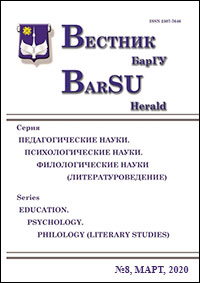“CRIMEAN SONNETS” BY ADAM MICZKEVICHTRANSLATED BY MAXIM TANK
Keywords:
sonnet; A. Miczkevich; literary translation; rhyme; syllabic verse; accentual-syllabic verse; comparative analysis; adequacyAbstract
The article deals with the translations of “Crimean Sonnets” by Adam Mickiewicz written by Maxim Tank. The Belarusian poet translated four sonnets of this cycle: “I. Stepy akermańskie” (“І. The Ackerman Steppe”), “IV. Burza”
(“IV. The Storm”) “V. Widok gór ze stepów Kozłowa” (“V. Mountains from the Keslov Steppe”) and “XVI. Góra Kikineis” (“The Kikineis Mountain”). The first two of them were published 80 years ago (1940). The translation of a strict poetic form, such as a sonnet, reveals the features of the Belarusian system of versification in the mid-20th century, the Belarusian literary process in general, and the discourse of translated literature in particular. The
author of the article carries out a comparative analysis of these translations by Maxim Tank and the original text, as well as the texts of other translators, concludes that the Belarusian poet manages to convey the plot, content, metaphoricity and emotionality of works by Mickiewicz, however, the form of the original sonnet is not saved. This shows that
Maxim Tank in these translations followed an emotionally determined method of creating sonnets, which was proposed by Janka Kupala, where deviations from the classical form are allowed for sensuality, although in the Belarusian sonnet system and sonnet translations there was a rationally determined method presented by Maxim Bаhdanovič. Nevertheless, these translations by Maxim Tank set an example for the translators of the next generations.
Ref.: 8 titles.
Downloads
Published
Issue
Section
License
Copyright (c) 2023 Вестник БарГУ Серия "Педагогические науки. Психологические науки. Филологические науки"
Это произведение доступно по лицензии Creative Commons «Attribution-NonCommercial» («Атрибуция — Некоммерческое использование») 4.0 Всемирная.
Авторы сохраняют за собой право заключать определенные договорные соглашения, касающиеся неисключительного распространения опубликованной версии работы (например, размещать ее в институциональном репозитории, публикация в книге) со ссылкой на ее первоначальную публикацию в этом журнале.





